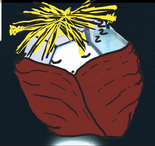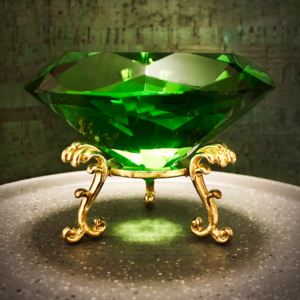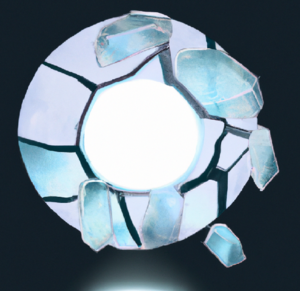(Updated links, added a bit more lore) |
Spiderjjr45 (talk | contribs) m (added Category:Wiki Worldbuilding Contest 2025 using HotCat) |
||
| (7 intermediate revisions by 3 users not shown) | |||
| Line 5: | Line 5: | ||
== Known Splinters == |
== Known Splinters == |
||
[[File:SplinterPottu.png|thumb|155x155px|The Splinter shortly after being purchased by Pot'tu.]] |
|||
* One Splinter was known to be in the hoard of [[The Green Stag]] |
* One Splinter was known to be in the hoard of [[The Green Stag]] after being stolen from [[Jadenhill]]. It was later taken by the [[Wold Order]] and used in their own operations, namely to cast ''Seeming'' on [[The Firegates]] to make the clean-cut cavern feel like a spooky dragon-and-monster filled dungeon. |
||
** From there, the Splinter was taken by the dwarf [[Karl Anders]], who eventually traded it with the goblin [[Pot'tu Kobb|Pot'tu]] |
** From there, the Splinter was taken by the [[dwarf]] [[Karl Anders]], who eventually traded it with the [[goblin]] [[Pot'tu Kobb|Pot'tu]]—who adopted it and called it "Lun'Gax" (or "Moon-Hoglet")—but eventually [[Pot'tu]] was convinced to trade away his "baby" to the gem [[dragonborn]] [[Durzibethinus|Durian]]. |
||
== Properties == |
== Properties == |
||
| Line 13: | Line 13: | ||
The Selune Splinter was said to be one of the largest and most beautiful prized possessions of Selune, goddess of the moon's light. |
The Selune Splinter was said to be one of the largest and most beautiful prized possessions of Selune, goddess of the moon's light. |
||
Splinters like these are said to have hailed down on Quelmar during an ancient devastation on the heavens. The Splinter itself holds no innate magic, but functions as an '''Arcane Amplifier''', allowing the range, duration, and other aspects of a spell to be enhanced. |
Splinters like these are said to have hailed down on [[Quelmar]] during an ancient devastation on the heavens. The Splinter itself holds no innate magic, but functions as an '''Arcane Amplifier''', allowing the range, duration, and other aspects of a spell to be enhanced. |
||
During the duration of a long rest, a spell can be infused into the Splinter, allowing it to become the point of casting. Doing so increases the power of the spell in a number of ways: |
During the duration of a long rest, a spell can be infused into the Splinter, allowing it to become the point of casting. Doing so increases the power of the spell in a number of ways: |
||
| Line 29: | Line 29: | ||
* ''Hallucinatory Terrain'' |
* ''Hallucinatory Terrain'' |
||
* ''Mordenkainen's Sanctum/Mansion'' |
* ''Mordenkainen's Sanctum/Mansion'' |
||
* ''Temple of the Gods'' |
* ''Temple of the [[Gods]]'' |
||
* ''Planar Binding'' |
* ''Planar Binding'' |
||
* ''Antipathy/Sympathy'' |
* ''Antipathy/Sympathy'' |
||
| Line 35: | Line 35: | ||
== Emerald Splinter == |
== Emerald Splinter == |
||
[[File:Emerald_Splinter.png|thumb|The Emerald Splinter atop its pedestal.]] |
[[File:Emerald_Splinter.png|thumb|The Emerald Splinter atop its pedestal.]] |
||
In 826 [[PR]]—following the final step of the ceremony to resurrect [[Sardior]] during [[The Battle of Five Lights]]—the Selune Splinter from [[Jadenhill]] was imbued with divine psionic power, taking on a glowing |
In 826 [[PR]]—following the final step of the ceremony to resurrect [[Sardior]] during [[The Battle of Five Lights]]—the Selune Splinter from [[Jadenhill]] was imbued with divine psionic power, taking on a glowing emerald hue and becoming the new emerald artifact of the resurrected [[Ruby Court]]. Now dubbed the Emerald Splinter, its arcane amplifying properties became even more pronounced as its owner—[[Durzibethinus]]—discovered that he could use it as a focus to psionically scry across the multiverse and even detect his own echoes from parallel realities. |
||
Like its predecessor—the [[ |
Like its predecessor—the [[Emerald Blade]]—the Emerald Splinter can create a small protective ward around its wielder…but instead of serving as a functional weapon in dangerous territories, the Splinter protects by helping to dodge danger altogether using its scrying feature. |
||
In his full-sized [[Dragon]] form, [[Durzibethinus]] can wear the Emerald Splinter set inside of a ring to use while out on missions. While in his lair or not being used, however, he locks it atop an enchanted pedestal of his own design. Paranoid about his ancestral artifact being stolen again, the pedestal will deal psychic damage to anyone who touches the Splinter if they lack the essence of an [[Emerald Dragon]]. |
In his full-sized [[Dragon]] form, [[Durzibethinus]] can wear the Emerald Splinter set inside of a ring to use while out on missions. While in his lair or not being used, however, he locks it atop an enchanted pedestal of his own design. Paranoid about his ancestral artifact being stolen again, the pedestal will deal psychic damage to anyone who touches the Splinter if they lack the essence of an [[Emerald Dragon]]. |
||
| Line 44: | Line 44: | ||
* The Selune Splinter originated from a plot thread in the [[Brightwater Campaign]], during which the adventuring party investigated a "shooting star" that had crashed into the sand dunes and left a glassy crater. Physical contact with the large, glowing meteorite caused the party to experience visions of Selune, so they chose to take it back with them on their desert ship. The eventual fate of the meteorite was left open-ended, except that it was brought back to [[Brightwater]] with the rest of the party's haul and later [[Merca]] for the Equinox Great Opening celebration. |
* The Selune Splinter originated from a plot thread in the [[Brightwater Campaign]], during which the adventuring party investigated a "shooting star" that had crashed into the sand dunes and left a glassy crater. Physical contact with the large, glowing meteorite caused the party to experience visions of Selune, so they chose to take it back with them on their desert ship. The eventual fate of the meteorite was left open-ended, except that it was brought back to [[Brightwater]] with the rest of the party's haul and later [[Merca]] for the Equinox Great Opening celebration. |
||
* There are accounts of some early nomadic tribes of [[Human#Pterish Humans|Pterish Humans]] using the Splinters to conceal |
* There are accounts of some early nomadic tribes of [[Human#Pterish Humans|Pterish Humans]] using the Splinters to conceal their caravans from dangerous desert monsters as well as raiders on trails such as [[Radarap]] along the central coast of [[Pteris]]. |
||
* It is unknown how many Selune Splinters were cut from the original meteorite, nor what would happen—if anything—were they to be brought back together. |
* It is unknown how many Selune Splinters were cut from the original meteorite, nor what would happen—if anything—were they to be brought back together. |
||
| Line 51: | Line 51: | ||
[[Category:Brightwater]] |
[[Category:Brightwater]] |
||
[[Category:Pteris]] |
[[Category:Pteris]] |
||
[[Category:Wiki Worldbuilding Contest 2025]] |
|||
Latest revision as of 06:23, 23 November 2025
The Selune Splinters are large gems that were cut from the same nine-foot-long Moonmaiden Crystal meteorite which crashed into central Pteris during 180 BR. They were separated over time and distributed across the realm, being coveted for their arcane amplifying properties. The most well-known of these gems belonged to the Court of Quartz in Jadenhill until it fell into possession of the Ruby Court and was transformed into the Emerald Splinter.
Appearance[edit | edit source]
Each Selune Splinter is carefully cut in order to amplify magic that is refracted through them. Despite being quite large and bulky, they are remarkably lightweight and most people would have little issue carrying one around in their arms. Another peculiar attribute is that they can be stood upright on their pointed end without falling over and will even return to this position when jostled. They glow with a silvery light whenever the moon is up, even when not in contact with moonlight.
Known Splinters[edit | edit source]

- One Splinter was known to be in the hoard of The Green Stag after being stolen from Jadenhill. It was later taken by the Wold Order and used in their own operations, namely to cast Seeming on The Firegates to make the clean-cut cavern feel like a spooky dragon-and-monster filled dungeon.
- From there, the Splinter was taken by the dwarf Karl Anders, who eventually traded it with the goblin Pot'tu—who adopted it and called it "Lun'Gax" (or "Moon-Hoglet")—but eventually Pot'tu was convinced to trade away his "baby" to the gem dragonborn Durian.
Properties[edit | edit source]
Description[edit | edit source]
The Selune Splinter was said to be one of the largest and most beautiful prized possessions of Selune, goddess of the moon's light.
Splinters like these are said to have hailed down on Quelmar during an ancient devastation on the heavens. The Splinter itself holds no innate magic, but functions as an Arcane Amplifier, allowing the range, duration, and other aspects of a spell to be enhanced.
During the duration of a long rest, a spell can be infused into the Splinter, allowing it to become the point of casting. Doing so increases the power of the spell in a number of ways:
- If the spell requires concentration, it no longer does so.
- Spells with durations of 8 hours or longer become infinite in duration, provided that the Splinter is not moved more than 10 feet from the spell's point of casting.
- The range of the spell increases tenfold. A 30 foot spell can cover a range of 300 feet. A spell with a range of touch is not affected by this property.
Optimal Spells[edit | edit source]
The Selune Splinter works best for amplifying ranged spells which could stand to benefit from an extended range or duration, such as:
- Control Weather
- Seeming
- Leomund's Tiny Hut
- Hallucinatory Terrain
- Mordenkainen's Sanctum/Mansion
- Temple of the Gods
- Planar Binding
- Antipathy/Sympathy
Emerald Splinter[edit | edit source]

In 826 PR—following the final step of the ceremony to resurrect Sardior during The Battle of Five Lights—the Selune Splinter from Jadenhill was imbued with divine psionic power, taking on a glowing emerald hue and becoming the new emerald artifact of the resurrected Ruby Court. Now dubbed the Emerald Splinter, its arcane amplifying properties became even more pronounced as its owner—Durzibethinus—discovered that he could use it as a focus to psionically scry across the multiverse and even detect his own echoes from parallel realities.
Like its predecessor—the Emerald Blade—the Emerald Splinter can create a small protective ward around its wielder…but instead of serving as a functional weapon in dangerous territories, the Splinter protects by helping to dodge danger altogether using its scrying feature.
In his full-sized Dragon form, Durzibethinus can wear the Emerald Splinter set inside of a ring to use while out on missions. While in his lair or not being used, however, he locks it atop an enchanted pedestal of his own design. Paranoid about his ancestral artifact being stolen again, the pedestal will deal psychic damage to anyone who touches the Splinter if they lack the essence of an Emerald Dragon.
Trivia[edit | edit source]
- The Selune Splinter originated from a plot thread in the Brightwater Campaign, during which the adventuring party investigated a "shooting star" that had crashed into the sand dunes and left a glassy crater. Physical contact with the large, glowing meteorite caused the party to experience visions of Selune, so they chose to take it back with them on their desert ship. The eventual fate of the meteorite was left open-ended, except that it was brought back to Brightwater with the rest of the party's haul and later Merca for the Equinox Great Opening celebration.
- There are accounts of some early nomadic tribes of Pterish Humans using the Splinters to conceal their caravans from dangerous desert monsters as well as raiders on trails such as Radarap along the central coast of Pteris.
- It is unknown how many Selune Splinters were cut from the original meteorite, nor what would happen—if anything—were they to be brought back together.

